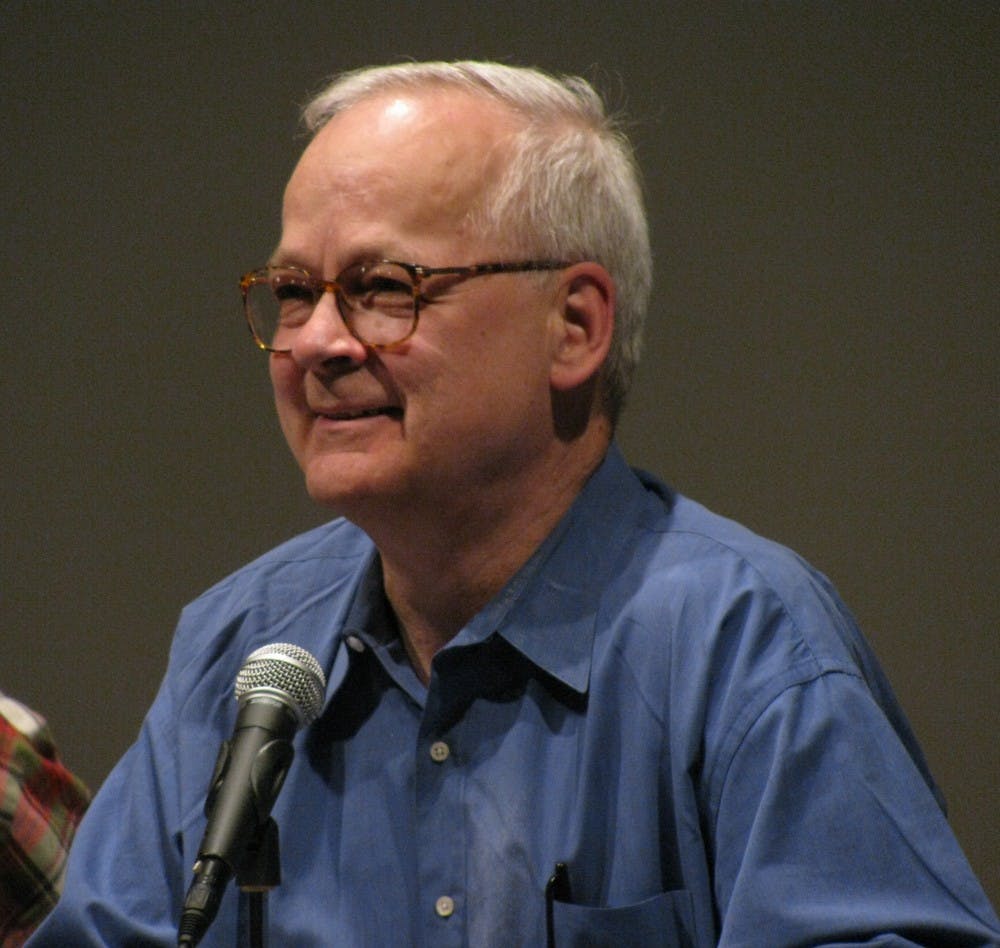“Completely in the Present: A Tribute to Tony Conrad” was a two-night screening event held on Friday and Saturday at the Parkway Theatre in tribute to experimental artist, filmmaker and musician Tony Conrad.
On both nights, Director Tyler Hubby introduced a screening of his film, Tony Conrad: Completely in the Present,which was followed by a live performance of music inspired by Conrad’s life and work.
The Maryland Film Festival and the Parkway Theatre partnered with Deakin (Josh Dibb) and Geologist (Brian Weitz), members of the local band, Animal Collective, to create this two-night event featuring local musicians and paying homage to one of America’s lesser-known artistic innovators.
Tony Conrad was an American visual artist, experimental filmmaker and musician who is considered a major innovator in both structural film and drone music.
Conrad was a member of the Theatre of Eternal Music, a group that used intonation and sustained sounds to produce what they called hallucinatory dream music, now called drone music.
Conrad and his early partners La Monte Young and John Cale also played a role in the formation of the Velvet Underground. Conrad composed and recorded several audio works with solo amplified violin and amplified strings, releasing albums such as Slapping Pythagoras in 1995, Four Violins in 1996, Outside the Dream Syndicate with Faust and Fantastic Glissando.
Conrad is also notable for his accomplishments in film and the visual arts. His 1966 film The Flicker, consisted entirely of completely black or completely white images, producing a projected flicker that drove some audience members to vomiting at its initial screenings.
Hubby’s movie ably traces the evolution of Conrad’s interest in music, film and art, including Conrad’s later innovations in public access television and citizen engagement.
Weitz of Animal Collective, gave an introduction to Friday night’s events, describing how he had first become familiar with Conrad’s work.
“I first saw Tony and heard Tony’s music in the late 90s. I went to school in New York and was getting more into experimental music,” Weitz told the crowd.
Weitz talked about the impact Conrad’s music had on his tastes.
“I had very little patience for drone or minimalism of any kind, and then I went to the Cooler one night to a radio benefit,” he said. “The only thing I remember from that night was Tony’s set. It was really transformative, it really opened my mind up to new ways of thinking about music.”
Weitz then introduced the film’s director, Hubby, who spoke about the random series of events that had led him to become acquainted with Conrad.
“This really all started for me in 1994, as that’s when I first met Tony. My then-roommate in San Francisco was a guy named Jeff Hunt who was starting a record label called Table of the Elements, and he was obsessed with reissuing this sort of lost-considered, embarrassing-LP called Outside the Dream Syndicate which was thought to be a Faust record,” Hubby said.
From there Hubby was able to connect with Conrad.
“[Hunt] contacted Tony in the media department where he was teaching up in Buffalo and asked him if he could do it, realizing eventually that this was really a Tony Conrad recording,” Hubby said.
Hubby began accumulating footage of Conrad during the 1994 tour that followed the release of this remastered LP, footage that later became a part of Completely In the Present.
Years later, Hubby reached out to Conrad about making a movie.
”Finally in 2010, I just wrote to him and said we need to do something with all of this. Let’s make a film, and Tony was game for that,” Hubby said.
Conrad died before the film’s release in 2016, however, Hubby does not view the film as merely an homage to his late friend but rather as a living representation of the man and his work.
“I think you’ll see that the film is not really meant as a memorial or eulogy or anything, the idea was to create this living document, and I think for those of us who knew Tony and were friends of his, it feels that way,” Hubby said to the audience.
To him the film is an extension of Conrad’s life. “It feels like he’s alive, in keeping with the title of this film, Completely in the Present, that was really the idea, that he lives outside of time,” Hubby said.
On Friday night, the post-film set list included music from Deakin and Geologist of Animal Collective, Owen Gardner and Steve Strohmeier. Visuals by Greg St. Pierre played across the big screen during these sets in an homage to the unique performing style of Conrad.
On Saturday night, the post-film concert featured performances from Dan Deacon, Jessie Hughes, and Martin Schmidt; Andrew Bernstein; Asa Osborne; and Daniel Conrad with visuals by Greg St. Pierre.





